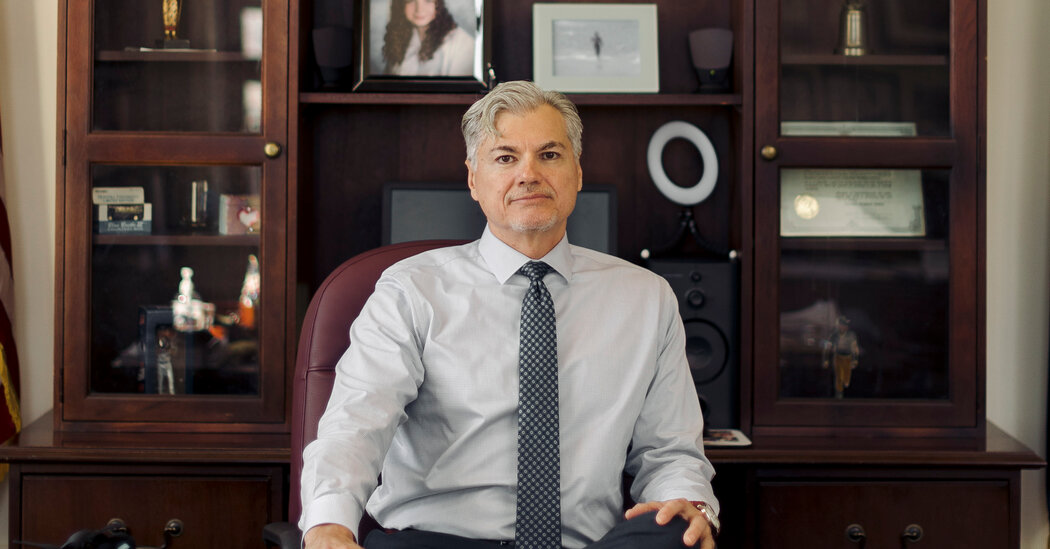
Hardwood timber The criminal tax fraud trial of Donald J. Trump’s family real estate business hinged on endless rows of spreadsheets and tax documents bristling with indecipherable numbers.
Most people in the courtroom did not know that one participant was unusually equipped to digest those dry details — the presiding judge, Juan M. Merchan, 60, who as a young man worked for several years as an internal auditor at a small real estate development company.
Now a jurist with 16 years on the bench, he oversaw the only consequential criminal trial to date involving the former president. His rulings likely helped determine the jury’s guilty verdict Tuesday.
At the heart of the case was whether the company, the Trump Organization, was responsible for a scheme to dole out off-the-books perks like leased Mercedes-Benzes and apartments to executives who failed to pay taxes on them. The case enraged Mr. Trump and his supporters and could permanently damage the business and influence the 2024 presidential campaign.
During the five-week trial, the gray-haired Justice Merchan maintained an order that is often lacking elsewhere in state court in what can be a rough-and-tumble practice of criminal law.
On Friday, the trial’s final day, one of the company’s lawyers kept interrupting the prosecution’s closing argument with objections. Finally, Justice Merchan made a frustrated gesture for the defense and prosecution to approach the bench. But during the sidebar, he was composed, listening to the lawyer, Susan R. Necheles, before telling her to let the prosecution continue talking about an exhibit.
“You objected three times already,” he said after Ms. Necheles explained her grievance. “Give him the opportunity to go through the chart. If that is your objection, it is overruled.”
Justice Merchan is a first-generation immigrant, born in Bogotá, Colombia. He came to the United States with his family when he was 6 years old, and grew up poor in Jackson Heights, Queens, according to people familiar with his background.
In Colombia, his father was a military officer who later served in the country’s intelligence service, the people said, and after coming to New York, he worked as a night dishwasher at the old Americana Hotel in Manhattan. His mother worked in New York at a range of jobs, including packaging food for airline meals and working in a zipper and toy factories.
The youngest of six and the first in his family to go to college, he began working at the age of 9, carrying groceries for tips, and then held jobs through high school that included washing dishes at a diner and delivering kosher meat. In college, he worked as a night manager at a hotel.
The judge earned a business degree from Baruch College, but not before dropping out to work as an internal auditor at the real estate firm, the United Nations Development Corporation. Several years later he returned to get his degree so he could go to law school, continuing to work to put himself college. The result, he later told people, was terrible grades.
He began his legal career in 1994 as an assistant district attorney in Manhattan after graduating from Hofstra University School of Law. After five years conducting trials and prosecuting financial fraud cases, he moved to the State Attorney General’s office, where he held positions overseeing civil cases on Long Island. Mayor Michael Bloomberg appointed him to the bench in Bronx Family Court in 2006, and since 2009, he has been an acting justice in State Supreme Court, presiding over felony criminal trials.
The judge is no stranger to high-profile or complex financial cases, but the largely staid proceedings of the tax fraud trial are a far cry from some of the other cases that have garnered media attention in his court.
For example, in one murder case, a Senegalese man tried to call an expert witness prosecutors identified as a witch doctor to testify that he killed his ex-girlfriend while under the influence of evil spirits. He also presided over the trial of a suburban woman accused of running a $2,000-an-hour escort service who tabloids dubbed “The Soccer Mom Madam.”
Justice Merchan’s work ethic was cited by several lawyers who have appeared before him. In addition to handling criminal trials in State Supreme Court, Justice Merchan also presides over the Manhattan Mental Health Court and the Veterans Treatment Court, which provide special services to nonviolent defendants.
“He is someone who reads every word on every page of every filing and every footnote — and then the cases that you cite to him,” said Jose A. Fanjul, a former Manhattan assistant district attorney who got to know Justice Merchan when he prosecuted a four-month white-collar fraud trial in the judge’s court. “His fidelity to the law and to getting it right lends to him this sort of moral purpose of what he’s doing that makes it a joy to practice in front of him.”
The post Judge in Trump Company Trial Knew How to Read the Numbers appeared first on New York Times.

